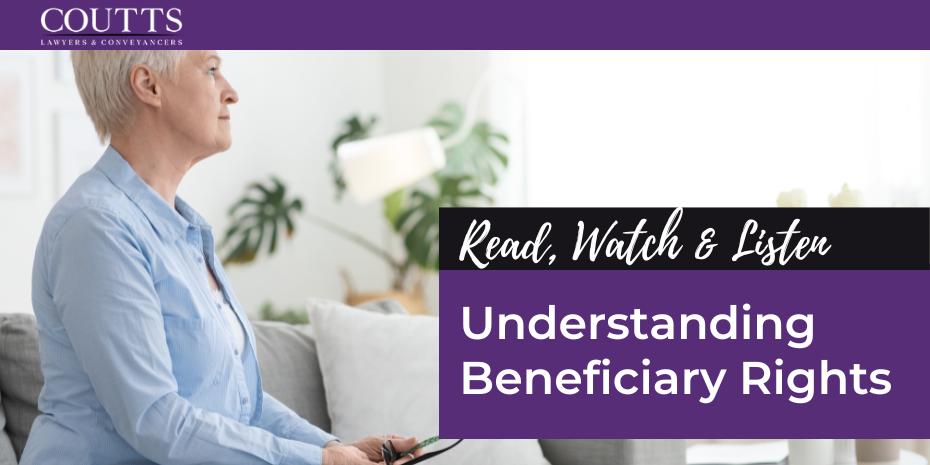KEY TAKE-OUTS:
- Everything you need to know about invalid Wills.
- Find out what happens if your Will is invalid and how to make sure it’s valid.
- An invalid Will can result in an old Will being reinstated or relatives you have no relationship with receiving your assets on your death.
- Marriage and Divorce can affect the validity of your Will.
A Will is a legal document that sets out your wishes on your death. These wishes can be:
- Who is to receive your assets such as your home, bank accounts, shares and personal possessions;
- Who you authorise to ensure your wishes are followed (executor);
- Who you wish to appoint as guardians of your infant children;
- Funeral and burial directions.
How do you make a valid Will?
For a Will to be valid in New South Wales, it must meet the legal requirements set out in the Succession Act 2006:
- It must be in writing and signed by you;
- There must be at least two witnesses present when you sign the Will;
- The two witnesses must also sign the Will in your presence;
- You must intend the document to be your Will.
In addition, you must:
- Be over 18 years old;
- Have testamentary capacity, i.e. you must understand:
- The Will comes into effect on your death;
- The Will sets out who is to receive your assets on your death;
- What assets you have to leave;
- Who would expect to receive your assets (for example, your spouse or children); and
- Not be affected by a delusion of the mind.
- Read, understand and approve of the Will;
- Not be under any undue pressure from anyone to write your Will in a certain way.
Can you make changes to a Will?
Any changes to your Will must be in writing and signed by you in the presence of two witnesses who also sign the Will you have changed.
To ensure there are no issues with the validity of the changes to the Will, it is preferable to make a new Will altogether including the changes, rather than making changes on an existing Will.
Alternatively, a document called a Codicil can be prepared as a secondary document to the Will. A Codicil is commonly used when there are minimal minor changes only. For example, a change of executor, or a change as to who is to receive a specific gift such as jewellery. If you have multiple changes or significant changes, a new Will should be prepared.
Why is it important to have a valid Will?
If your Will is considered invalid by the Court and you had a previous Will which is still in existence, your previous Will may be considered your valid Will. This Will may be outdated and not set out your current wishes.
If your Will is considered invalid and you have no previous Will, the law will determine who will receive your assets on your death and who will be responsible for dealing with those assets.
The law in this area is known as “intestacy” and it sets out a pre-determined list of who is entitled to your assets on death if you do not have a valid Will. This list is firstly, based on your marital status and whether you have children. Secondly, if you don’t have a spouse (including de facto) or children, your assets will pass to parents or siblings or grandparents and potentially nieces, nephews and cousins, depending on your circumstances.
Your relationship with your relatives may be such that you do not want them to receive your assets upon your death.
It is therefore vitally important that you have a valid Will which accurately reflects your intentions on your death to avoid either of the above scenarios occurring against your wishes.
The effect of marriage on a Will
If you make a Will and marry after the Will was made, your Will will be revoked on your marriage, unless the will was made “in contemplation of marriage”.
Although these words need not be written in the Will to prove that it was your intention that the Will remain valid after your marriage, it is preferable to ensure that there is no question about your intent.
If it cannot be proved that you did not intend the Will to continue to be valid after your marriage, the Will is revoked and again, either an earlier Will may be deemed your valid Will or the rules of intestacy will apply if you have no previous valid Will.
If, however you have left a gift in your Will to a person who you are married to at the time of your death, this gift will not be revoked but the rest of the Will will be revoked.
Similarly, the appointment of executor of a person to whom you are married at the time of your death will not be revoked.
Example
John has been going out with Claudia for a year. He instructs his solicitor to prepare a Will appointing Claudia as his executor and giving Claudia $100,000. He gives the rest of his assets to his beloved niece Kate.
6 months later John marries Claudia. John does not update his Will. One month later, John dies.
Other than the appointment of Claudia as executor and the gift she receives of $100,000, John’s Will is revoked, as he did not express it to be in contemplation of marriage,
As John did not have a previous Will, the laws of intestacy decide that Claudia (as John’s wife) receives the whole of John’s estate and Kate receives nothing.
The effect of Divorce on a Will
Divorce does not revoke a Will unless you state in your Will that the Will is to be revoked on your divorce.
Any gift or appointment of your spouse as executor in your Will, will however be revoked once you are divorced. The rest of the Will will however remain valid.
Example
Bob and Cathy are married and have Wills appointing each other as executor and appointing their eldest son Colin as the substitute executor.
Bob and Cathy are firstly leaving their assets to each other and on the death of both, their assets pass to their three children.
Bob and Cathy get divorced. Cathy updates her Will to remove Bob.
Bob does not update his Will. Bob dies.
Cathy’s appointment as Bob’s executor is revoked. Cathy does not receive any assets from Bob’s Will.
Instead, Colin is Bob’s executor and his three children receive his assets.
The effect of separation on a Will
Separation does not however affect the validity of a Will, even if you have been separated for many years.
In the above scenario, if Bob and Cathy separate but do not divorce and Bob dies 20 years after they separate, Cathy remains his executor and is entitled to receive all of his assets.
How Can Coutts Lawyers and Conveyancers help you?
To ensure your Will is valid, it is strongly recommended that you obtain legal advice.
Contact the friendly Wills team at Coutts Legal to arrange an appointment to discuss your particular needs.
For further information please don’t hesitate to contact:
info@couttslegal.com.au
1300 268 887
Contact Coutts Lawyers & Conveyancers today.
This blog is merely general and non-specific information on the subject matter and is not and should not be considered or relied on as legal advice. Coutts is not responsible for any cost, expense, loss or liability whatsoever in relation to this blog, including all or any reliance on this blog or use or application of this blog by you.



